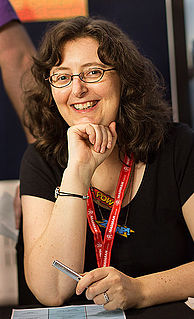A Quote by John Updike
Writing fiction is like music. You have to keep it moving. You can have slow movements but there has to be a sense of momentum, of going someplace. You hear a snatch of Beethoven and it has a sense of momentum that is unmistakably his. That's a nice quality if you can do it in fiction.
Related Quotes
I want to be a jazzman until the day I die. To help keep that motion, momentum and movement going, for myself, for my students, for the people who hear me. Oh sure, some days you look around at this country and look at the evidence and think, Oh Lord, don't look good. But you keep moving. You gotta keep moving.
Inspiration comes from so many sources. Music, other fiction, the non-fiction I read, TV shows, films, news reports, people I know, stories I hear, misheard words or lyrics, dreams... Motivation? The memory of the rush I get from a really good writing session - even on a bad day, I know I'll find that again if I keep going.
On the plane, I like to read fiction set in the location I'm going to. Fiction is in many ways more useful than a guidebook, because it gives you those little details, a sense of the way a place smells, an emotional sense of the place. So, I'll bring Graham Greene's The Quiet American if I'm going to Vietnam. It's good to feel romantic about a destination before you arrive.
When we look at a good deal of serious modern fiction, and particularly Southern fiction, we find this quality about it that is generally described, in a pejorative sense, as grotesque. Of course, I have found that anything that comes out of the South is going to be called grotesque by the Northern reader, unless it is grotesque, in which case it is going to be called realistic.... Whenever I'm asked why Southern writers particularly have a penchant for writing about freaks, I say it is because we are still able to recognize one.
In a sense, journalism can be both helpful and detrimental to a writer of fiction because the kind of writing you need to do as a journalist is so different. It has to be clear, unambiguous, concise, and as a writer often you are trying to do things that are more ambiguous. I find that writing fiction is often an antidote to reading and writing too much journalism.
When people say "How do you write a book, how does it all happen?" I say, you line things up, and you line them up as actually as you possibly can, but sooner or later the book has got momentum and it's moving along under that momentum. It's like a sculpture, if you're working with the grain of the wood, the wood will start defining what shape it's going to become.







































